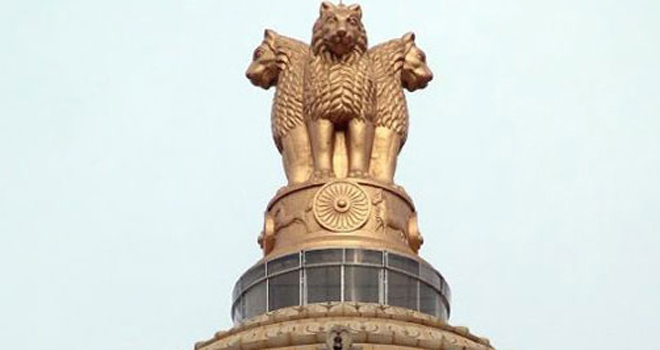
A file photo.
NEW DELHI (PTI): The government has set a target of USD 26 billion turnover in aerospace and military manufacturing in next five years, Defence Minister Rajnath Singh said, noting that indigenous defence production was key to achieving the country's aim to be a USD 5 trillion economy by 2024.
He said adequate thrust is being given on enhancing defence exports though the primary aim of indigenous defence production is to cater to the needs of the armed forces.
In an address at the ET Global Business Summit, urged the private sector to increase its participation in defence manufacturing to realise the government's vision of making India a USD 5 trillion economy by 2024.
Last year, Prime Minister Narendra Modi set an ambitious target of making India's economy a USD 5 trillion one by 2024. The current size of the Indian economy is around USD 2.8 trillion.
In his address, Singh said the manufacturing sector has the potential to reach USD 1 trillion by 2025 and that the government is striving to achieve the goal by implementing key flagship programmes like 'Make in India'.
"In our envisaged Defence Production Policy, we have clearly spelt out our goal to achieve a turnover of USD 26 billion in aerospace and defence goods and services by 2025. This will have huge implications for India's endeavours to promote R&D, innovation and its efforts to secure a place in global supply chains," he said.
Asking the defence industry to make best use of the opportunities, he said a slew of structural reforms has been initiated by the government to ensure synergy among key stakeholders.
Singh said the government accorded approval to more than 200 proposals worth Rs 4 lakh crore in defence manufacturing in the last five years.
He also said the government's aim is to double the size of aeronautics industry from Rs 30,000 crore to Rs 60,000 crore by 2024.
He said a number of major platforms are envisaged in defence aerospace sector including India's 90-seater civil aircraft, developing civil helicopter industry of USD 5 billion in public-private-partnership model.
He listed out several reform measures including simplification of the industrial licensing process, hike in FDI cap, making defence export less stringent, streamlining the defence offset policy and opening the government-owned trial and testing facilities for the private sector.
Singh said defence public sector undertakings have been encouraged to increase their export portfolio to 25 per cent of their turnover and the government is willing to extend Lines of Credit and grants to friendly foreign countries over the next five years.
"The government aims to achieve exports of defence goods and services to the tune of USD 5 billion in next five years. All possible support would be extended to the private sector so that they can contribute significantly to enable us to achieve the said target," he added.
Highlighting the decision to enhance foreign equity cap from earlier 26 per cent to 49 per cent under the automatic route and up to 100 per cent under the government approval route, he said the measures have begun to show results.
"Till December 2019, the defence and aerospace sector has received inflows of over Rs 3,155 crore. Of this, Rs 1,834 crore have received since 2014. I am sure that the volume of investment will increase manifold when some of the major programmes, which are in the pipeline, move into the execution phase," he added.
Singh stressed that the intention of the government is not just limited to bringing reforms but to act as an incubator, catalyst and facilitator for promoting investment and achieving self-reliance in defence manufacturing.
"We understand that Defence R and D in private sector will take time to establish itself. To give a boost to this process, we have opened opportunities through DRDO (Defence Research and Development Organisation) with a zero fee for Transfer of Technology (ToT), free access to over 450 patents, access to test facilities and an upfront funding of up to Rs 10 crore," he said.
Singh said more than 900 licensing agreements for ToT have been signed with private industries.
He also mentioned about the opportunities being provided by the government for the manufacture of mega defence platforms including fighter aircraft, helicopters, tanks and submarines under the strategic partnership model.
The defence minister told the gathering that the government has prepared a roadmap for application of artificial intelligence in national security set up, adding there is a plan to develop at least 25 defence specific artificial intelligence products by 2024.
 Previous Article
Previous Article












The Indian Air Force, in its flight trials evaluation report submitted before the Defence Ministry l..
view articleAn insight into the Medium Multi-Role Combat Aircraft competition...
view articleSky enthusiasts can now spot the International Space Station (ISS) commanded by Indian-American astr..
view article